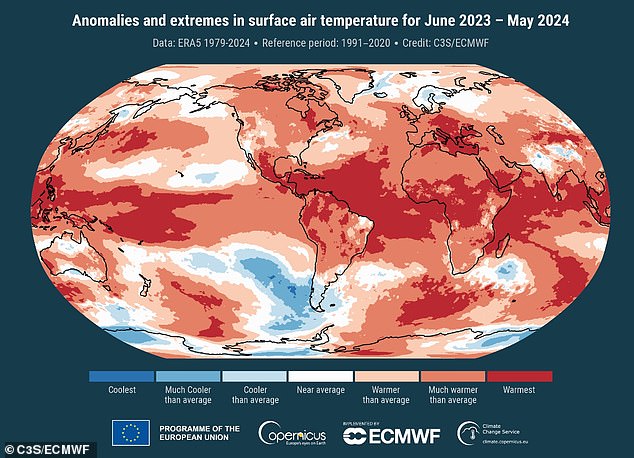Last month was officially the hottest May on record since 1940, as revealed by the EU climate change programme.
The global average temperature for May 2024 was 60.6°F (15.91°C), 0.34°F (0.19°C) above the temperature of the previous warmest May, in 2020.
Worryingly, this is also 1.17°F (0.65°C) warmer than the 1991-2020 May global average, with experts pointing to greenhouse gas emissions as the cause.
May 2024 also marks the 12th consecutive record-breaking month, with each month since June 2023 being the hottest ever recorded.
Dr Samantha Burgess, director of the EU’s Copernicus Climate Change Service (C3S), said the climate “continues to alarm us”.
March 2024 was the warmest March on record globally, with an average surface air temperature of 60.6°F (15.91°C).

Globally, May 2024 was the warmest May since at least 1940, when EU department records began. Pictured is a man sunbathing in Hastings, East Sussex, May 9, 2024.
He pointed to global warming and El Niño, the unusual warming of surface waters in the eastern tropical Pacific Ocean.
“The last 12 months have been record breaking like never before, mainly due to our greenhouse gas emissions and the added boost of the El Niño event in the tropical Pacific,” said Dr Burgess.
‘Until we reach net-zero global emissions, the climate will continue to warm, continue to break records, and continue to produce even more extreme weather events.
“If we choose to continue adding greenhouse gases to the atmosphere, then 2023/4 will soon look like a cold year, similar to how 2015/6 now looks.”
This follows confirmation from the Met Office that the UK had the warmest May and spring on record, despite them being “wet and dull”.
But this new EU reading is an average for the entire world and therefore gives a broader picture of how the planet’s overall temperature is changing.

Experts say the last 12 months have “broken records like never before.” In the photo, a woman tries to cool off on a hot afternoon at Connaught Place in New Delhi, India, on May 12, 2024.

May 2024 marks the 12th consecutive record-breaking month, and every month since June 2023 has been the hottest on record.
C3S, managed by the European Commission, analyzes temperature readings based on a variety of platforms and instruments, from weather stations to weather balloons and satellites.
The department’s readings refer to the average air temperature for the entire planet throughout the year, so they are lower than a single, typically “hot” temperature reading.
According to C3S, May 2024 was 2.73°F (1.52°C) above the estimated May average for 1850-1900, the designated pre-industrial reference period.
What’s more, the global average temperature for the past 12 months (June 2023 to May 2024) is now the highest on record.
The past 12 months have been 0.75°C (1.35°F) above the 1991-2020 average and 1.63°C (2.93°F) above the pre-industrial average from 1850 to 1900, it said. the Department.
Looking at Europe separately from the rest of the world, temperatures last month were 1.58°F (0.88°C) above the 1991-2020 May average, making May 2024 the third warmest May on record in Europe.

A lady shelters herself under the umbrella on a hot day in Chilla Village, as the temperature rises in Delhi-NCRon on May 31, 2024 in New Delhi, India

Women stay cool in the heat at the Temple of Dawn, or Wat Arun, in Bangkok, Thailand, on May 6, 2024.

Met Office that the UK had the warmest May and spring on record, despite being “wet and dull”. The public enjoy the warm weather at a swimming pool in Hathersage, Derbyshire, England, May 10, 2024.
CS3 said much of the Iberian Peninsula, southwestern Turkey and a large region of Eastern Europe, including southern Scandinavia and the Baltics, were drier than average last month.
But May 2024 was wetter than average across much of Iceland, the United Kingdom and Ireland, central and most of southeastern Europe, the northern Iberian Peninsula and western Russia.
Globally, drier than average regions included the southwest and parts of the interior of the US and Canada, the western Caspian Sea, central Asia and extreme southern China, regions of Australia, most of the Americas of South and southern Africa.
CS3 also revealed that the global average sea surface temperature (another metric that measures heat near the ocean surface) was 20.93°C last month, the highest value recorded for the month of May.


